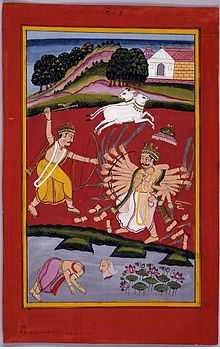Kartavirya Arjuna

Kartavirya Arjuna (Sanskrit: कार्तवीर्य अर्जुन, Kārtavīrya Arjuna), was a legendary king of an ancient Haihayas kingdom (Kalchuri Rajputs) with capital at Mahishamati which is on the banks of Narmada River in the current state of Madhya Pradesh. Kartavirya was son of Kritavirya, king of the Haihayas. This is his patronymic, by which he is best known; his real name was Kartaviryarjuna. He is described as having a thousand hands and a great devotee of god Dattatreya.
Vayu Purana extolls his virtues
Having worshipped a portion of the divine being called Dattatreya, sprung from the race of Atri, he sought and obtained these boons: a thousand arms and a golden chariot that went wheresoever he willed it to go; the power of restraining wrong by justice; the conquest of the earth and the disposition to rule it righteously; invincibility by enemies, and death at the hands of a man who was more powerful than himself. By him this earth was perfectly governed," and of him it is said:-"No other king shall ever equal Kartavirya in regard to sacrifices, liberality, austerities, courtesy, and self-restraint." "Thus he ruled for 85,000 years with unbroken health, prosperity, strength, and valour.
The Mahabharata mentions him as one of the best warriors and introduces his divine origin, attributing it to the Padmini Ekadasi :
The king (Kartavirya Arjuna's father) was very happy to hear this. Naturally he asked for the son he had desired for so long: 'O master of the universe, O killer of the Madhu demon, kindly grant me a son who will never be conquered by demigods, human beings, snakes, demons, or hobgoblins, but whom only You can defeat.' The Supreme Lord immediately replied, 'So be it!' and disappeared.The king became very pleased with his wife and returned to his palace in her company. Padmini soon became pregnant, and the many armed Kartaviryarjuna appeared as her son. He was the mightiest person in all the three worlds, and thus even tenheaded Ravana could not defeat him in battle. Except for Lord Narayana, who holds a club, a disc, and other symbols in his hands, no one could overcome him. By the merit that resulted from his mother's strict and faithful observance of Padmini Ekadasi, he could defeat even the dreaded Ravana. This is not at all surprising, O Naradaji, for Kartaviryarjuna was the fulfillment of the benediction of the Supreme Personality of Godhead." With these words, Pulastya Muni departed.
The Supreme Lord, Sri Krisna, concluded, 'O sinless Yudhisthira, as you have inquired from me, I have explained to you the power of this special Ekadasi. O best of kings, whoever observes this fast will surely attain to My personal abode. And similarly, if you want all your desires fulfilled, you should do likewise.
The prayer for return of lost or misplaced things is addressed to Karthviryarjuna.{reference needed}
Encounter with Parashurama

The Puranas recount that Kartavirya Arjuna and his army visited a rishi named Jamadagni, who fed his guest and the whole army with offerings from his divine cow Kamadhenu. The king demanded the cow for the betterment of his subjects; Jamadagni refused because he needed the cow for his religious ceremonies. King Kartavirya Arjuna sent his soldiers to take the cow. As the conflict developed among the Jamadagni and the King,Kartavirya Arjuna lost his cool and chopped off the head of Jamadagni . When Parashurama (Jamadagni's son and one of the Daśāvatāras of Vishnu) returned to the hermitage,he was informed of the context by his mother.In revenge, Parashurama killed the entire clan of Kartavirya Arjuna and the King with a battleaxe given to him by Shiva, thus conquering the entire earth, which he gave to Brahamanas.
In another legend, Kartavirya Arjuna visited the hermitage of Jamadagni, and was received by that sage's wife Renuka with all respect; but he made an ill return for her hospitality, and carried off by violence "the calf of the milch-cow of the sacred oblation." For this outrage Parashurama cut off his thousand arms and killed him.
In another place a different character is given to him, and more in accordance with his behavior at Jamadagni's hut. "He oppressed both men and gods," so that the latter appealed to Vishnu for succor. That God then came down to the earth as Parashurama for the special purpose of killing him.[1]
Encounter with Ravana

Kartavirya's power is popularly told in the Ramayana. He was the contemporary of Ravana. The story goes that once when Kartavirya Arjuna was having a bath in the river Godavari along with his wives, he stopped the force of the river with his thousand arms from both the sides. The teenage Dasagriva (Ravana), who was singing the hymns of Shiva and praying to him, made him lose his concentration. Enraged, he challenged the former for a combat. Ravana was defeated and was put to humiliation.Then on request of his paternal grandfather Pulastya the great emperor Kartaviryarjuna released Ravana. Another account states that when Ravana came "in the course of his campaign of conquest to Mahishmati (the capital of Kartavirya), he was captured without difficulty, and was confined like a wild beast in a corner of his city." The Vayu Purana states that Kartavirya invaded Lanka, and there took Ravana as prisoner, but later he was killed by Parashurama and Ravana was rescued from Karthavirya.[2] .[2]
References
| |||||||||||||||||||||
